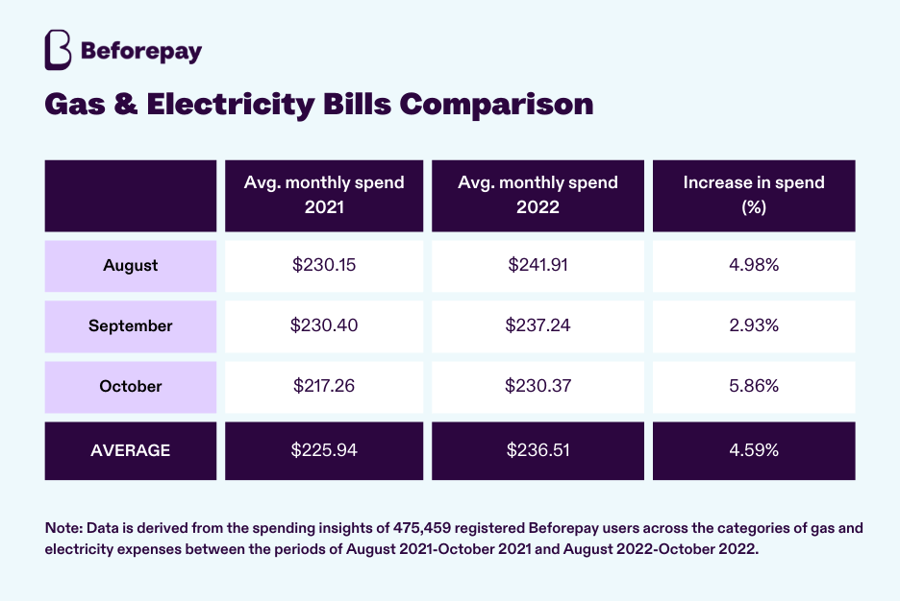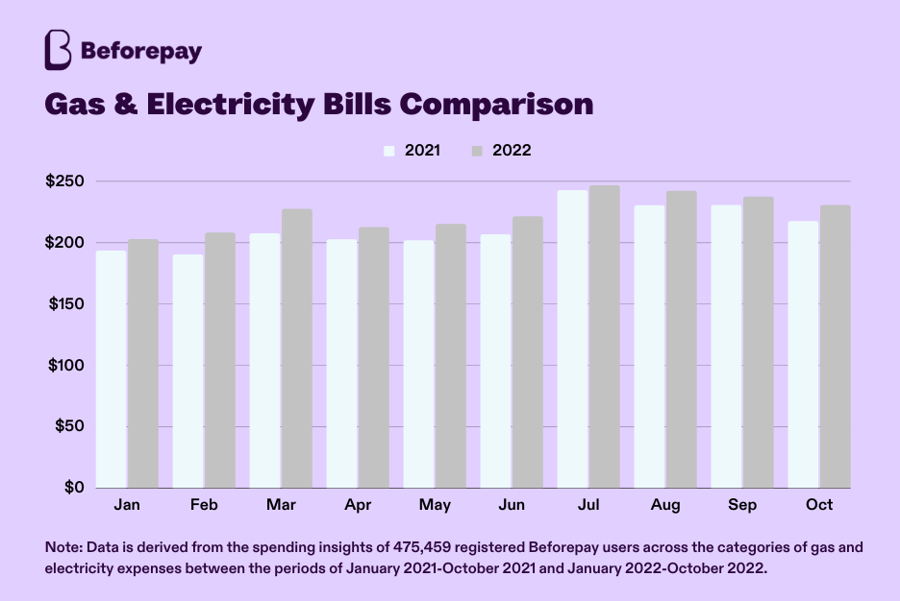How to Save on Your Electricity Bill in Summer
The contents provided on this page are for informational purposes only and do not constitute financial advice.
Did you know Tasmanians use the most energy in Australia, averaging 8,619kWh per year as of August 2022?
Victorians have the lowest energy consumption per year, at an average of 4,615kWh.
Rising energy prices means your next electricity bill could be a lot higher than you expect.
This makes now the perfect time to revisit your electricity bill and understand what you’re paying, how it compares to other Australian households, and things you can do to make sure you’re not paying more than you need to.
How much does the average Australian pay for their gas and electricity bill every month?
To give us a general idea of the price Australians are paying on gas and electricity bills we analysed the utility expenses of more than 475,000 Beforepay users.
Based on Beforepay insights from August to October 2022, Australians are currently paying a monthly average of $236.51 for their gas and electricity bills.

If we assume the same prices across a 12-month period, that equates to paying an extra $42 on gas and electricity bills every year.
See how much you could potentially save on electricity bills

It’s important to note that how much you pay for your electricity bill also depends on a number of factors, including:
- your location
- your provider and your rate
- the size of your home
- the number of people in your household
- the number of appliances you use
- seasonal influences.
For instance, electricity bills will likely be higher during summer and winter due to the increased use of cooling and heating appliances, and even more when you have a larger space and more people.
In addition, some states and territories in Australia have regulated retail energy prices. This means in some areas the government sets the price that retailers must charge customers. Below are areas where energy prices are regulated as listed by the Australian Energy Regulator:
Electricity is regulated in:
- Queensland
- Tasmania
- Australian Capital Territory.
Gas is regulated in:
- New South Wales.
Electricity and gas are not regulated in:
- Victoria
- South Australia.
Why is my electricity bill rising?
If you’ve noticed that your electricity bill is higher than usual, you’re not the only one. In fact, households around the world are feeling the squeeze as energy prices are rising on a global scale.
An annual comparison of Beforepay gas and electricity bills shows an average increase of 5.6% when comparing costs from January to October 2022 with the same period in 2021.
Utility bills in general (including broadband internet and mobile bills) increased annually by an average of 9.6% when comparing the same period.

Electricity prices are expected to increase by an average of 20% in Australia this financial year (July 2022 - June 2023), and a further 30% in 2023-2024.
Globally, pressures like political events, extreme weather and increased demand can affect the availability, supply and cost of energy. Greater demand and less available supply costs retailers more to provide these services, which is how we end up with scenarios like the recent spike in wholesale prices that sees wholesalers charging more to generate electricity.
But wholesale costs are just one component of your electricity bill. The breakdown of your electricity bill includes:
- Retail costs - for the service delivered by your provider (e.g. managing your account).
- Wholesale costs - for the actual production of electricity and gas.
- Network costs - for the building, maintenance and distribution of electricity and gas.
- Green costs - for government programs to save energy and develop renewable energy.
Changes in any of these can impact and contribute to an overall increase in your electricity bill.
Network costs in particular are also expected to rise in Australia as we continue to develop our infrastructure and change the way we distribute electricity and gas to our homes and businesses.
Want to know more about what you’re paying for on your electricity bill? Visit the Australian Energy Regulator website.
You can also visit our Compare and Save platform to compare electricity plans from different providers.
Compare providers to find better rates
How can I save money on my electricity bill in summer?
While we might not be able to control the factors that are causing our electricity bills to rise, we can control our everyday habits to reduce costs and save money where we can.
Here are some quick and easy changes you can make to stay cool while keeping costs low during summer!
1. Give your fans some air time
Fans use less energy to circulate cool air than air conditioning systems, which means you’ll spend less to cool down. To give you an idea, fans can cost around $0.02 per hour to run. This compares to a range of $0.20-$0.70 per hour for a reverse cycle air conditioning system.
You can opt to mix it up, alternating between a fan and air conditioning to get the best of both worlds while balancing your costs.
2. Set your air conditioning to an energy-efficient temperature
Did you know you can save up to 10% on your energy costs for each degree that you increase the temperature on your air conditioning? So if and when you do use your air conditioning this summer, be mindful about the temperature you set.
Your target temperature for energy-efficient performance will depend on your region, but you can see what the best temperature for your area is here.
And while we’re on the topic of air conditioning, make sure you do your regular maintenance like cleaning the filters so your air conditioner doesn’t have to work twice as hard to cool your place.
3. Block out the heat
The beauty of the Australian summer is the blazing sunlight we get to enjoy for more than 10 hours each day. The thing about our sun, though, is it’s really hot. And every window and space you have is an opportunity for the sunlight to heat up your home.
Doing things like drawing your blinds or curtains and shutting your doors can help to reduce this heat and your electricity bills by minimising the amount of cooling you need to do to stay comfortable.
4. Skip the dryer
Take advantage of the heat and sunshine if you can! Hanging your laundry out to dry instead of using your dryer during summer can help to reduce your electricity bill.
Not only will you save on the electricity used to run your dryer; you’ll also reduce the heat circulating in your home, reducing the work your fans and air conditioners have to do to keep your home cool!
5. Use timers on your appliances
This sounds simple, but it can make a big difference in helping you reduce your electricity bill.
Setting a timer on your cooling appliances can help to ensure you don’t run the risk of them running longer than they need to, or in some cases accidentally running for hours through the night!
You could also use a timer to set appliances to run only during off-peak hours, saving you extra money.
6. Explore off-peak electricity rates
Off-peak refers to a period of time during the day when your energy provider will charge you less for your electricity usage.
The typical work day sees people having similar morning and evening routines, making these busy or “peak” times for energy use. Some providers will offer lower, discounted rates to use your electricity during off-peak hours as an incentive to help manage the distribution of electricity across Australia’s networks.
Off-peak times will vary among different energy providers, as well as your location and, in some instances, the season.
The type of electricity meter you have and the way it is configured will also impact whether or not you are eligible for off-peak electricity rates.
You can contact your provider to check or use Beforepay’s Compare and Save platform to compare different plans.
Using electricity during off-peak times doesn’t mean doing everything you need to do at absurd hours! It can be about being strategic when it comes to using certain appliances, like turning on your air conditioner or setting your dishwasher to run only during off-peak hours to help you save money.
7. Compare electricity plans
With energy prices and the cost of living continuing to rise, now is a good time to review your electricity plans - how much you’re paying, how your recent bills compare to previous ones, and how this impacts your overall budget for living expenses.
Comparing your current electricity plan with other providers can also help you explore other cost-effective options, see your potential savings, and see if there’s an alternative plan that’s better suited to your budget and lifestyle.
Compare and Save with Beforepay
Compare and Save is a new Beforepay service that makes it simple for you to compare electricity plans with a range of providers, as well as gas and broadband internet plans.
With Compare and Save, you can see how much you could potentially save on your bills and easily switch if you find a plan that suits you.
Comparing plans is free on Beforepay’s Compare and Save service, and does not involve paying or signing up for utilities with Beforepay. We simply help you find your potential savings and switch!
If you do decide to switch providers and submit an application through our platform, your selected provider will contact you directly to manage the transfer of your service.
For more information and to start comparing visit beforepay.com.au/compare-and-save.
Compare electricity plans to see your potential savings
Disclaimer: Beforepay Group Ltd, ABN: 63 633 925 505. Beforepay allows eligible customers to access their pay and provides budgeting tools. Beforepay does not provide financial products, financial advice or credit products. The views provided in this article include factual information and the personal opinions of relevant Beforepay staff and do not constitute financial advice. Beforepay and its related bodies corporate make no representation or warranty, express or implied, as to the accuracy, completeness, timeliness or reliability of the contents of this blog post and do not accept any liability for any loss whatsoever arising from the use of this information. Please read our Terms of Service carefully before deciding whether to use any of our services.

%20(505%20x%20320%20px)%20(8).png)
%20(505%20x%20320%20px)%20(2).png)